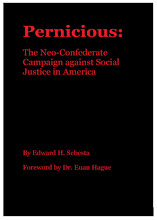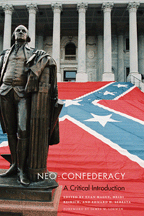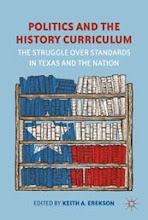One of the cover articles of the Nov. 2007, UDC Magazine, the official publication of the United Daughters of the Confederacy (UDC) is "Christmas Songs as Union Propaganda." On page 12, Sybil R. Willingham, Historian General of the UDC 2007-2008, has an article titled on that page, "Christmas Songs as Propaganda."
As Willingham explains:
"New Songs have been added over the years, and sometimes writer put their own words, opinions and political views to the Christmas story in an effort to influence the public. Some of our favorite hymns that we enjoy singing today contained controversial verses that have since been removed. Such was the case with the issue of slavery and the looming conflict that threatened to erupt between the North and the South."
Imagine that, someone might think the Christmas spirit is incompatible with slavery!
So what are these Christmas songs with their 'insidious' "Propaganda"?
One is it seems, "It Came Upon a Midnight Clear," published by a Dr. Edmond Sears in 1849 which Willingham claims out has an anti-slavery message in the 2nd verse which is no longer sung as follows:
"Yet with the woes of sin and strife
The world hath suffered long;
Beneath the angel-strain have rolled
Two thousand years of wrong;
And man, at war with man, hears not
The love song which they bring;
O hush the noise, ye men of strife,
And hear the angels sing!
If this is an anti-slavery message, so much the better I would say. Exactly what is controversial about this verse and who would find it controversial?
Another Christmas carol which Willingham sees as Abolitionist propaganda, is "O Holy Night." Willingham refers to a 3rd verse of the song as follows:
Truly He taught us to love one another;
His law is love and His Gospel peace.
Chain shall He break for the slave is our brother
And in His Name all oppression shall cease.
Sweet hymns of joy in grateful chorus raise we,
Let all within us praise His holy Name!
If we aren't singing this verse, we should, in my thinking, that is, if you a Christmas singing person. Again, to whom would this be a controversial verse?
Then Willingham moves on to the song "I Heard the Bells on Christmas Day" with words written by Henry Wadsworth Longfellow and set to music by John Baptiste Calkin. The verses she quotes are:
Then from each black, accursed mouth
the cannon thundered in the South,
And with the sound the carols drowned
Of peace on earth, goodwill to men
It was as if an earthquake rent
The hearth-stones of a continent,
And made forlorn the house-holds born
Of peace on earth, goodwill to men
Then in a section of the article titled "The Songs We Loved" Willingham tells us that the previously mentioned songs were not likely to have been sung in the South during the Civil War, (Especially the one that hadn't been set to music until 1872). She then gives brief histories of songs that didn't have abolitionist backgrounds and suggests.
"As you gather 'round with friends and family this Christmas, perhaps you will join in singing some of the old favorites that our Confederate ancestors sang, too."
Which would exclude Christmas songs written by abolitionists.
Well, if you listen to Christmas carols, try to make these Christmas carols that Willingham calls propaganda to those that you listen to. See if you can find complete versions.
Saturday, December 12, 2009
Subscribe to:
Posts (Atom)
Popular Posts Last 30 days
-
Washington Post columnist Colbert King has an opinion piece "Rise of the New Confederacy," about the Republican Party and the Tea...
-
The article is here: http://www.washingtonpost.com/wp-dyn/content/article/2010/08/10/AR2010081004586.html?hpid=opinionsbox1 Incidentally...
-
At this link is an article on the response to the likely election of Obama as president of the United States in the Canadian National Post ....
-
On the lighter side there is a shop in Gettysburg, Pennsylvania that sells Elvis memorabilia and it connects itself to the Civil War memory ...
-
I have contacted both of my U.S. Senators Kay Bailey Hutchison and John Cornyn . The following is the automated reply from Cornyn and the...
-
I have added extra metarials to the page. I decided to add the information about the states which have either Confederate or Confederate ide...
-
Ironically, it is a Republican, not a Democratic candidate who has gotten the most attacks regarding the Confederacy from Neo-Confederate or...
-
The League of the South (LS) put up a bill board in Alabama like their billboard in Florida. This is a link about the Florida billboard at...
-
The ramp which was used by the cranes and other lifting equipment to go up and in the enclosed area and remove the statues and the base has ...
-
This is his Confederate post as part of his anti-vaxxer Facebook postings. https://www.facebook.com/chaz.blimline/posts/916814451694947:0 T...
Popular Posts All Time
-
The article is here: http://www.washingtonpost.com/wp-dyn/content/article/2010/08/10/AR2010081004586.html?hpid=opinionsbox1 Incidentally...
-
At this link is an article on the response to the likely election of Obama as president of the United States in the Canadian National Post ....
-
Washington Post columnist Colbert King has an opinion piece "Rise of the New Confederacy," about the Republican Party and the Tea...
-
There hasn't been an issue of the Southern Partisan (SP) for some time, about a year. I was doing some Internet researching and I stumb...
-
The other major neo-Confederate groups have gone under or just live on as remnants. The League of the South is just perhaps a dozen or may...
-
There is a new movie coming out, "12 Years a Slave." The link to the review and a trailer is at this link: http://www.slate.com/...
-
The League of the South (LS) put up a bill board in Alabama like their billboard in Florida. This is a link about the Florida billboard at...
-
The title of the essay is, "Time to Lose the Confederate Flag: Some Heresies for the Civil War Sesquicentennial," by Craig Silver....
-
The "Daily Beast" has an article titled, "Racists on the Prowl," which is about the head of the Towson White Student Uni...
-
The Southern Baptist Convention has passed a resolution condemning the Confederate battle flag. An article announcing the passage of a res...






